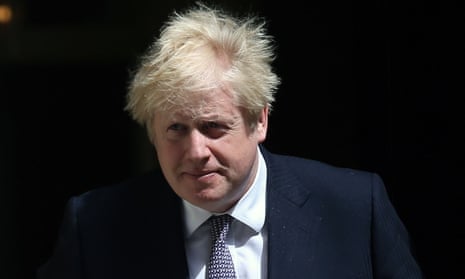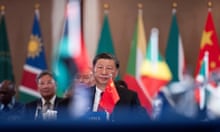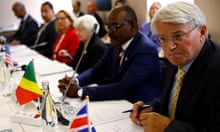UK aid cuts of 42% will leave about 70,000 people without health services and 100,000 without water in Cox’s Bazar, the world’s largest refugee settlement, before the deadly cyclone season, the Foreign Office minister for Asia has been warned.
A private letter sent to him last week by a group of aid agencies working in the area comes before a vote on Monday designed to force ministers to guarantee they will restore UK aid to 0.7% of gross national income next year.
The government faces the dilemma of trying to stymie the Conservative-led rebellion in the week Britain chairs the G7, or backing down.
Boris Johnson still believes the aid cuts are politically popular and that the rebels, led by the former international development secretary Andrew Mitchell and the former prime minister Theresa May, are out of touch.
But the mounting impact of a second year of cuts is making it more likely Johnson will side with the majority view inside the Foreign Office and announce aid will be restored to 0.7% next year.
The letter to the Asia minister, Nigel Adams, on the plight of refugees in Cox’s Bazar, Bangladesh, most of whom have fled the brutal regime in Myanmar, underlines the impact of UK aid cuts in sensitive areas.
The letter says: “The 42% cuts represent a staggering reduction in light of government statements, and the current reality faced by those in Cox’s Bazar. After the publication of the integrated review, NGOs were assured that Bangladesh was an important part of the ‘Indo-Pacific tilt’. Just last year as the UK cosponsored a global conference to mobilise resources, the foreign secretary urged the world ‘not to turn away from Rohingyas’ suffering’.”
The letter says cuts are likely to have two primary impacts. “First, it will significantly undermine efforts to address humanitarian needs in Cox’s Bazar. While risks to refugees have been rising, funding for the response has been in decline since last year when key sectors prioritised by the UK including water and sanitation, gender-based violence (GBV), shelter and education were between 80% and 92% underfunded”.
The second impact is likely to be felt through an increase in Covid infections in the camps, the letter says.
On Sunday, Johnson called for the whole world to be vaccinated against coronavirus by the end of next year, but no refugees have been vaccinated in Cox’s Bazar.
While there has been no major outbreak so far, the letter says: “The security situation in the camps has dramatically deteriorated, access to education and livelihoods remains highly constrained risking a lost generation of children, while evidence indicates that cases of GBV are rising. This year has also seen a 300% increase in fires destroying homes of tens of thousands of refugees. In response, an increasing number of people are turning to smugglers and risking their lives to get out of the camps.”
The UK, a former colonial power in Myanmar, is the second largest donor, contributing £321m to the response since 2017, but the sudden and unpredictable nature of Foreign Office cuts has left agencies unable to plan. The letter, sent on Thursday, says “one Foreign Office aid partner reports that planned and existing projects targeting approximately 50,000 Rohingya refugees and members of the host community have been terminated”.
Funding is not being renewed for projects supporting children with disabilities to access education and other services, undermining a key pillar of the UK’s disability inclusion strategy.
The targets to cut UK aid, agreed in outline in January, are based on now unduly pessimistic forecasts of the size of the economy this year, rebels say, meaning more than £1bn in extra cuts are being imposed than required. OECD forecasts, hailed by the Treasury, say UK growth this year will be above 7% and not the 5.1% forecast in March.









